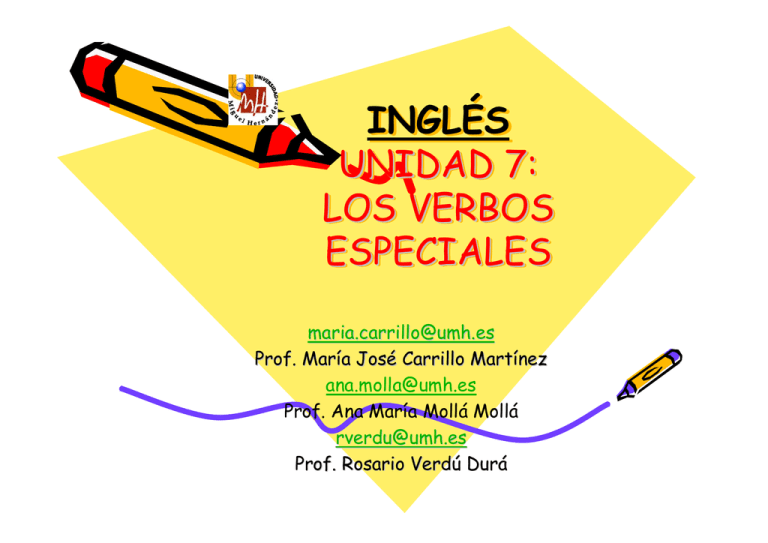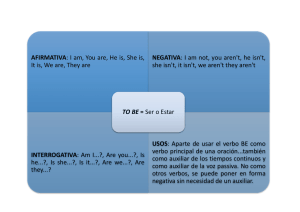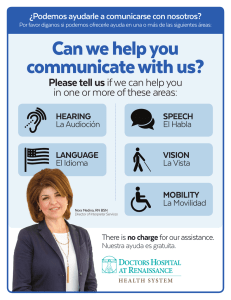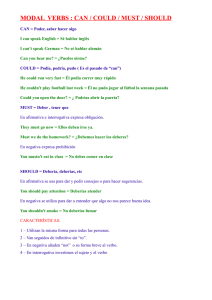UNIDAD 7 LOS VERBOS ESPECIALES
Anuncio

INGLÉS UNIDAD 7: LOS VERBOS ESPECIALES [email protected] Prof. María José Carrillo Martínez [email protected] Prof. Ana María Mollá Mollá [email protected] Prof. Rosario Verdú Durá UNIDAD 7: LOS VERBOS ESPECIALES. • • • • • • • • • Auxiliares y modales. El verbo to be. El verbo to have. El verbo to do. Los modos can y could. Los modos may y might. El modo must. El modo ought to. Los verbos shall, should, will y would. VERBOS AUXILIARES : • Verbos especiales: grupo cerrado de verbos que presentan anomalías, es decir, no siguen las reglas generales. Se dividen en: AUXILIARES Y MODALES. • AUXILIARES: Intervienen en la formación de la negativa, interrogativa, tiempos compuestos, continuos… be – am / are / is / was / were do – do / does / did have – have / has / had VERBOS MODALES: • MODALES: son verbos de características muy especiales. Se añaden al verbo principal para añadir un determinado matiz a la frase, para expresar una modalidad, por ejemplo obligación, permiso, capacidad… • Los verbos modales comparten las siguientes características: 1) no llevan “to” ni delante ni detrás excepto ought to, have to y need to. I must find my medicine / She should go to the doctor’s 2) no se les añade –s en la tercera persona del singular. Son invariables. He can speak English / She must be ill 3) no necesitan el auxiliar do / does para construir las formas negativa e interrogativa. Niegan añadiendo not. Can you drive? / She shouldn’t work so hard. 4) no tienen ciertos tiempos verbales. Tienen una única forma, por eso hay que recurrir en ocasiones a verbos con significado similar. She can sing beautifully. In the future she will be able to study singing. VERBO TO BE: • Además de verbo auxiliar puede ser verbo principal de la oración. Se usa: - como auxiliar de los tiempos continuos. The children are painting / I wasn’t waiting anybody. - como auxiliar de la voz pasiva. The roof is being repaired / America was discovered by Colón. - como verbo principal seguido de nombres comunes, nombres propios, adverbios y frases adverbiales de lugar (equivaliendo a estar) y adjetivos. We are teachers / This is Helen / They are at home in the evenings / She is tired VERBO TO HAVE: • Al igual que “be” puede hacer función de auxiliar y de verbo principal. Sus usos son: - como auxiliar con el significado de “haber” en los tiempos perfectos. They have already gone / We had been looking for you. - como verbo auxiliar/principal con la forma “have got” y tiene el significado de “tener, poseer”. She has got a lot of money / Has she got a dog? / Does she have a dog?(American English) - como verbo principal con otros valores que adquiere dependiendo de la palabra que lo acompañe. have breakfast / have lunch / have dinner / have a shower / have a drink / have a rest / have an aspirin VERBO TO DO: • Funciona como auxiliar y como principal. Usos: - como auxiliar con las formas “do/does” para el present simple. Do you speak French?. Yes, I do. - como auxiliar con la forma “did” para el past simple. She didn’t go to the party / Did she go at last? - como principal con el significado de “hacer” en sentido general. Recordar que hay otro verbo “hacer” con el sentido de fabricar que es “make”. do a favour / do the ironing / do sport / do up make a mistake / make the bed / make an excuse / make up EL MODAL CAN (poder): • • • • USOS: Habilidad, capacidad o conocimiento para hacer algo. Mary can run very fast Posibilidad de hacer algo / imposibilidad en negativa. This year we can ski because it has been snowing a lot lately You can’t buy fruit now. The shops are closed. Petición informal Can you help me? Sugerencia. You can take a taxi if you are tired. EL MODAL COULD (podía/podría): • • • • USOS: Habilidad pasada She could run fast when she was a child. Posibilidad It could be dangerous for women to compete. Petición formal Could you help me with my suitcases? Sugerencia formal You could do exercise and eat healthier food EL MODAL MAY (poder) USOS. • Dar y pedir permiso o hacer peticiones educadas. You may only use a pen for the exam / May I interrupt you? / May I see your tickets, please? • Posibilidad (puede / quizá) He may invite us to his party / It may rain tomorrow. EL MODAL MIGHT (podría) USOS: • Posibilidad remota (podría ser que / pudiera ser que) It might rain tomorrow She might win the gold medal in the competition. EL MODAL MUST (deber) • • • • • USOS: Expresar una obligación o dar una orden. I must revise the irregular verbs / English pupils must wear uniform Indicar una necesidad imperiosa de hacer algo. You must visit the doctor. You are sneezing a lot. Expresar una deducción o sacar una conclusión lógica. She’s got such neat notebooks. She must be a good student. MUSTN’T se usa para expresar una prohibición. You mustn’t exceed the speed limit. HAVE TO (tener que) es la forma verbal con un sentido similar a “must” aunque tienen sus diferencias. You have to be on time (es tu obligación) You must be on time (yo te lo impongo) LOS MODALES SHOULD Y OUGHT TO (debería) • Los modales SHOULD y OUGHT TO son verbos muy parecidos en la mayoría de sus usos pero OUGHT TO no es tan frecuente en las formas interrogativa y negativa. You should/ought to save money. You are spending too much. You shouldn’t yawn during the lecture. USOS: • Dar consejos u opiniones You should/ought to improve your pronunciation. WILL / WOULD / SHALL: • WILL se usa para hacer peticiones o pedir favores. Will you please close de window? • WOULD se utiliza para hacer peticiones y ofrecimientos de manera educada. Would you do me a favour? Would you like something to drink? • SHALL se usa para hacer ofrecimientos y sugerencias. Shall I help you with your luggage? Shall we go out for dinner tonight?



![2. decir – to say, tell [yo digo] 6. repetir – to repeat 7. reír – to laugh](http://s2.studylib.es/store/data/004577496_1-921269dc49beb854639c32fc2fea858d-300x300.png)